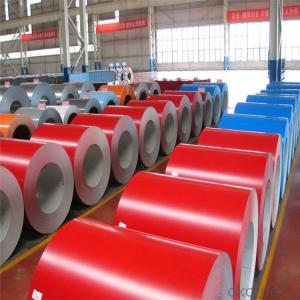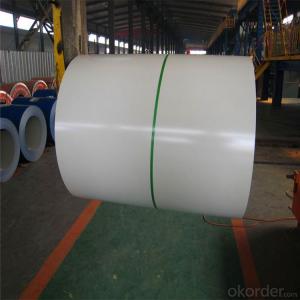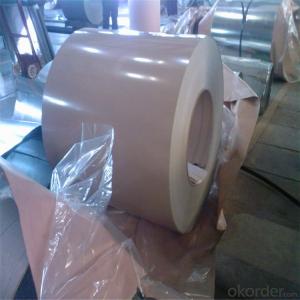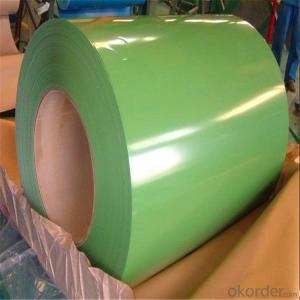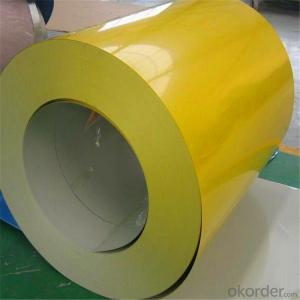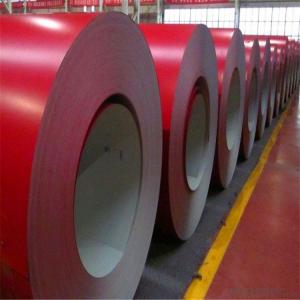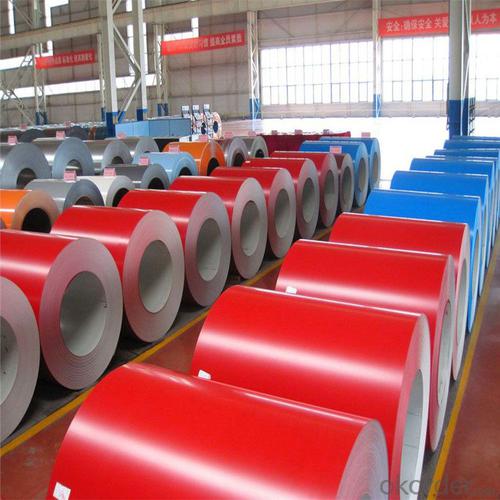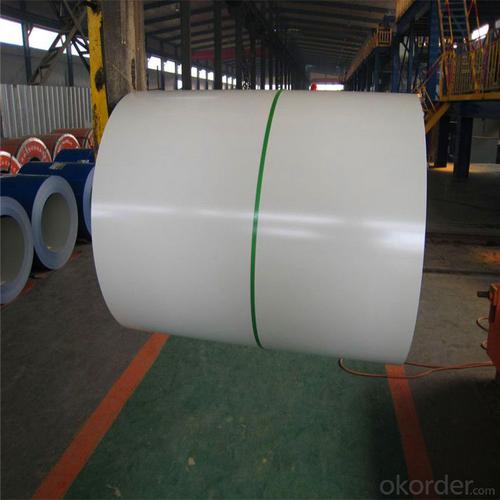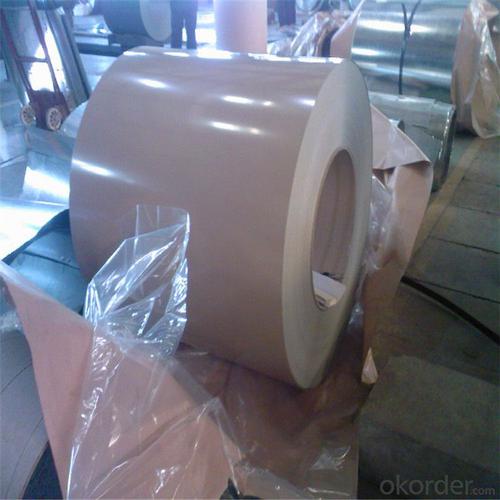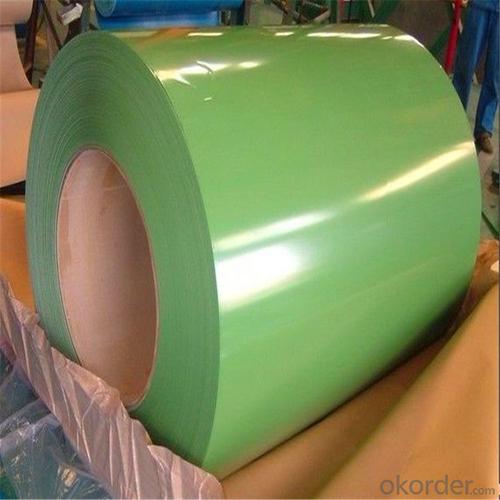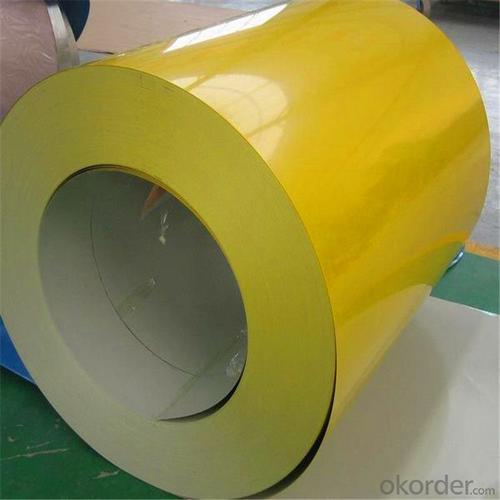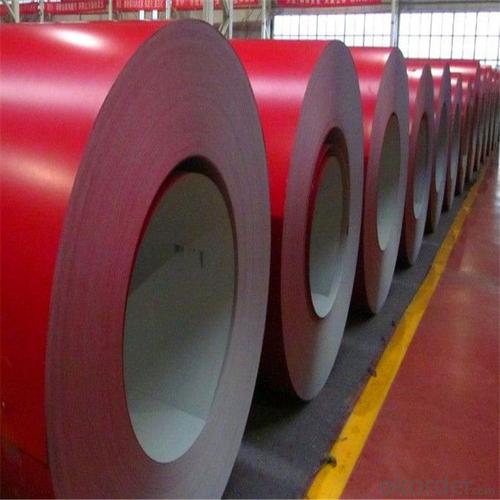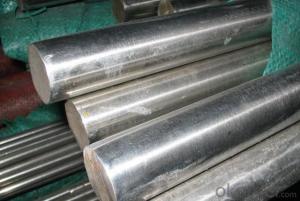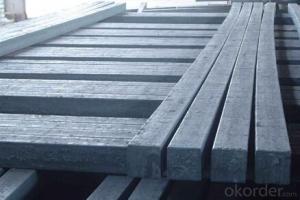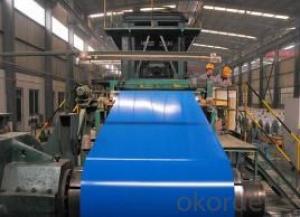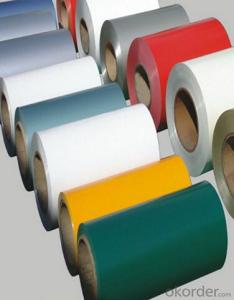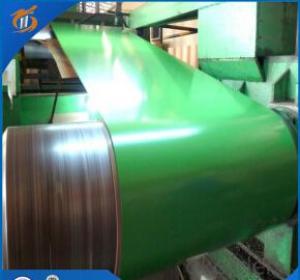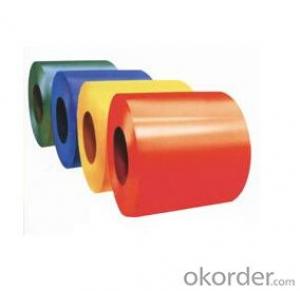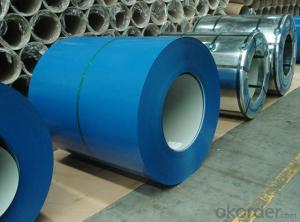Colour Coated PPGI Coils for Building Material
- Loading Port:
- Tianjin
- Payment Terms:
- TT or LC
- Min Order Qty:
- 25 m.t.
- Supply Capability:
- 5000 m.t./month
OKorder Service Pledge
OKorder Financial Service
You Might Also Like
Specification
Colour Coated PPGI Coils for Building Material
Description of Colour Coated PPGI Coils for Building Material
Product | PPGI/PPGL |
Capacity | 5,000 tons/month |
Base material | Hot dipped galvanized steel |
Thickness | 0.2-2.0mm |
Width | 600-1250mm(according to your need) |
Coil Weight | 3-6tons |
Quality | SGCC, DX51D |
Color | RAL No. or customers samples’ color |
Zinc-coating | 30g/m2-180g/m2 |
Coil ID | 508mm/610mm |
Technique | Cold rolled—hot dipped galvanized—color coated |
Painting | Top painting:15~25μm |
Back painting: 6~10μm | |
Tolerance | Thickness: +/-0.02mm |
Width:+/-2mm | |
Shipment time | within 15-45 workdays |
Payment | T/T, L/C at sight |
Packing | Standard export packing |
The special order can be negotiated. | |
Application of Colour Coated PPGI Coils for Building Material
APPLICATION OF OUR PREPAINTED STEEL | ||||||||||
Construction | Outside | Workshop,agricultural warehouse,residential precast unit | ||||||||
corrugated roof,roller shutter door,rainwater drainage pipe,retailer booth | ||||||||||
Inside | Door,doorcase,light steel roof stucture,folding screen,elevator,stairway,ven gutter,Construction Wall | |||||||||
Electrical applicance | Refrigerator,washer,switch cabnet,instrument cabinet,air conditioning,micro-wave owen,bread maker | |||||||||
Fuiniture | Central heating slice,lampshade,chifforobe,desk,bed,locker,bookself | |||||||||
Carrying trade | Exterior decoration of auto and train,clapboard,container,isolation lairage,isolation board | |||||||||
Qthers | Writing panel,garbagecan,billboard,timekeeper,typewriter,instrument panel,weight sensor,photographic equipment | |||||||||
Products Show of Colour Coated PPGI Coils for Building Material

Product Advantages
1.With nearly 20 years experience in prepainted steel, accommodate different marketdemands. | ||||||||||||||
2.'Quality first, service first' is our business aim; 'The good faith get respect,cast quality market' is our Business philosophy . | ||||||||||||||
3.Having two series producttion line,with the abbual production capacity of 240000 tons. | ||||||||||||||
4.Exceed International ISO9001:2008&ISO14001:2004 quality and environmental standards | ||||||||||||||
5.Meet with ROHS standard |
Company Information
CNBM International Corporation is the most important trading platform of CNBM group.
Whith its advantages, CNBM International are mainly concentrate on Cement, Glass, Iron and Steel, Ceramics industries and devotes herself for supplying high qulity series of refractories as well as technical consultancies and logistics solutions.


F A Q
1, Your advantages?
professional products inquiry, products knowledge train (for agents), smooth goods delivery, excellent customer solution proposale
2, Test & Certificate?
SGS test is available, customer inspection before shipping is welcome, third party inspection is no problem
3, Factory or Trading Company?
CNBM is a trading company but we have so many protocol factories and CNBM works as a trading department of these factories. Also CNBM is the holding company of many factories.
4, Payment Terms?
30% TT as deposit and 70% before delivery.
Irrevocable L/C at sight.
5, Trading Terms?
EXW, FOB, CIF, FFR, CNF
6, After-sale Service?
CNBM provides the services and support you need for every step of our cooperation. We're the business partner you can trust.
For any problem, please kindly contact us at any your convenient time.
We'll reply you in our first priority within 24 hours.
- Q: How does special steel contribute to the mining equipment industry?
- Special steel plays a crucial role in the mining equipment industry by providing enhanced durability, strength, and resistance to wear and corrosion. The mining sector relies heavily on robust and reliable equipment, as it operates in challenging and harsh environments. Special steel, which is specifically designed to withstand extreme conditions, helps to improve the overall performance and longevity of mining equipment. One of the main advantages of special steel in the mining industry is its exceptional strength. Mining equipment is subjected to intense forces, such as crushing, impact, and abrasion, which can quickly degrade conventional materials. Special steel, on the other hand, offers superior strength properties, allowing mining equipment to withstand heavy loads and resist deformation or breakage. Furthermore, special steel provides excellent resistance to wear and corrosion, which are common challenges in mining operations. The abrasive nature of rocks and minerals can quickly wear down regular steel, reducing the lifespan of equipment and increasing maintenance costs. Special steel, with its higher hardness and wear resistance, helps to minimize the impact of abrasive materials, prolonging the life of mining equipment and reducing downtime. Corrosion is another prevalent issue in the mining industry, as equipment is often exposed to moisture, chemicals, and harsh environments. Special steel is specifically formulated to resist corrosion, ensuring that mining equipment remains structurally sound and functional even in corrosive conditions. This resistance to corrosion improves the overall safety and reliability of mining operations. Moreover, special steel offers flexibility in terms of design and customization, allowing manufacturers to develop mining equipment tailored to specific needs. By utilizing different grades of special steel, manufacturers can optimize the properties of mining equipment, enabling it to meet the unique requirements of different mining applications. In conclusion, special steel significantly contributes to the mining equipment industry by providing enhanced strength, durability, wear resistance, and corrosion resistance. The utilization of special steel in mining equipment helps to improve performance, extend equipment lifespan, reduce maintenance costs, and enhance safety in mining operations.
- Q: How does special steel perform in high-temperature environments?
- Special steel performs exceptionally well in high-temperature environments. It has a high melting point, excellent resistance to heat and thermal shock, and can retain its strength and hardness even at elevated temperatures. This makes it highly suitable for applications such as aerospace, power generation, and automotive industries, where materials are exposed to extreme heat and require exceptional performance and durability.
- Q: How does special steel enhance the durability of products?
- Special steel enhances the durability of products by providing them with superior strength, hardness, and resistance to corrosion and wear. Its unique composition and manufacturing processes result in a material that can withstand high pressure, extreme temperatures, and harsh environments, making it ideal for applications where regular steel would fail. This enhanced durability ultimately leads to longer product lifespans, increased reliability, and reduced maintenance costs.
- Q: What are the different grades of special steel?
- There are several grades of special steel, including stainless steel grades such as 304, 316, and 430; tool steel grades like D2, O1, and A2; and high-speed steel grades such as M2 and M42. Each grade has unique properties and applications, making them suitable for various industries and specific purposes.
- Q: Can special steel be used in the construction equipment manufacturing industry?
- Yes, special steel can be used in the construction equipment manufacturing industry. Special steel is known for its high strength, durability, and resistance to wear and corrosion, making it an ideal material for producing heavy-duty construction equipment such as excavators, bulldozers, cranes, and loaders. Additionally, special steel can be customized to meet specific requirements, ensuring the construction equipment meets the necessary performance and safety standards.
- Q: What are the different magnetic grades of special steel?
- Various applications commonly utilize different magnetic grades of special steel. Some well-known magnetic grades include: 1. Soft Magnetic Materials: These special steel grades possess high magnetic permeability and low coercivity. They are ideal for applications requiring strong magnetic induction, such as transformers, electric motors, and magnetic cores for electrical devices. 2. Martensitic Stainless Steels: In their hardened state, these special steel grades exhibit a high magnetic permeability. They are commonly employed in cutlery, tools, and specific automotive components. 3. Ferritic Stainless Steels: Although their magnetic permeability is lower compared to martensitic stainless steels, these special steel grades are still magnetic. They find application in automotive exhaust systems, decorative trim, and appliances. 4. Duplex Stainless Steels: These special steel grades have a mixed microstructure of austenite and ferrite, resulting in a magnetic response. They are renowned for their exceptional corrosion resistance and are utilized in chemical processing equipment and offshore oil and gas platforms, where both strength and corrosion resistance are crucial. 5. Austenitic Stainless Steels: In their annealed state, these special steel grades are non-magnetic. However, slight magnetism can be observed when they undergo cold working or contain specific alloying elements. Austenitic stainless steels are widely used in food processing equipment, architectural structures, and medical devices. It is important to remember that the presence or absence of magnetism in special steel grades can vary depending on factors such as composition, heat treatment, and processing. Therefore, it is essential to consider the specific requirements of an application when selecting the appropriate magnetic grade of special steel.
- Q: What are the specific requirements for special steel used in the railway sector?
- The specific requirements for special steel used in the railway sector are crucial for ensuring the safety, durability, and efficient operation of the railway infrastructure. Some of the key requirements include: 1. High strength: Special steel used in the railway sector must possess exceptional strength to withstand heavy loads, vibrations, and impacts. This is crucial for maintaining the structural integrity of tracks, bridges, and other components. 2. Wear resistance: Railway tracks and wheels experience significant wear due to continuous contact and friction. Special steel must have excellent wear resistance to minimize the need for frequent maintenance and replacement. 3. Fatigue resistance: The constant cyclic loading experienced by railway components demands high fatigue resistance in the steel. This allows them to withstand repetitive stress and prevents the occurrence of fatigue failures. 4. Corrosion resistance: Railway infrastructure is exposed to various environmental conditions, such as moisture, extreme temperatures, and chemicals. Special steel must possess good corrosion resistance to prevent rusting and degradation, ensuring a longer service life. 5. Heat resistance: In certain applications, such as rail joints and fasteners, special steel is subjected to high temperatures due to friction and stresses. The steel must have good heat resistance to maintain its mechanical properties under such conditions. 6. Weldability: Special steel used in the railway sector should have good weldability to enable efficient and reliable joining of components during manufacturing and maintenance processes. 7. Ductility and toughness: The steel must exhibit sufficient ductility and toughness to absorb energy and resist fracture in the event of a collision or impact, ensuring passenger safety. 8. Dimensional stability: Special steel used in the railway sector must maintain its dimensional stability under varying temperatures and loads to prevent deformation and ensure proper alignment of tracks and components. Meeting these specific requirements for special steel in the railway sector is essential for ensuring the safety, reliability, and longevity of railway infrastructure, contributing to the smooth operation of the entire transport network.
- Q: What are the advantages of using special steel over other materials?
- Special steel has several advantages over other materials. Firstly, it offers exceptional strength and durability, making it ideal for applications where high performance and reliability are crucial. Additionally, special steel possesses excellent resistance to corrosion, heat, and wear, ensuring longevity and reduced maintenance costs. Moreover, it provides versatility in terms of customization and can be tailored to specific requirements, making it suitable for a wide range of industries and applications. Lastly, special steel offers superior machinability and weldability, facilitating ease of processing and fabrication.
- Q: How does special steel perform in high-temperature mechanical fatigue conditions?
- Special steel, such as heat-resistant or high-temperature steel alloys, is specifically designed to excel in high-temperature mechanical fatigue conditions. It demonstrates superior resistance to thermal expansion, corrosion, and oxidation, allowing it to maintain its structural integrity and mechanical properties even at elevated temperatures. This type of steel exhibits excellent strength, toughness, and creep resistance under prolonged cyclic loading, making it a reliable material for applications in high-temperature mechanical fatigue conditions.
- Q: What are the main characteristics of high-speed steel forgings?
- Highly desirable in various industries are high-speed steel forgings, which possess several key characteristics. To begin, the exceptional hardness and wear resistance of high-speed steel forgings are noteworthy. This is a result of their composition, which typically includes elements like tungsten, molybdenum, chromium, and vanadium. These elements create hard carbides within the steel matrix, leading to a material capable of enduring high temperatures and resisting abrasion and deformation. Additionally, high-speed steel forgings exhibit excellent heat resistance, enabling them to maintain their hardness and strength even at elevated temperatures. This is particularly significant in applications where tools or components undergo intense heat during operation. Another important trait of high-speed steel forgings is their ability to retain a sharp cutting edge for extended periods. This proves advantageous in cutting tools, where an efficient and precise machining process relies on a sharp edge. The steel's high hardness ensures the cutting edge remains sharp, resulting in enhanced tool life and performance. Moreover, high-speed steel forgings demonstrate good toughness and impact resistance, making them less vulnerable to cracking or chipping under heavy loads or sudden impacts. This ensures their durability and reliability in demanding applications. In addition to these mechanical properties, high-speed steel forgings possess excellent machinability. They can be easily shaped, formed, and machined into intricate geometries, making them ideal for producing complex components or tools. Overall, the main characteristics of high-speed steel forgings encompass exceptional hardness, wear resistance, heat resistance, cutting edge retention, toughness, impact resistance, and machinability. These qualities render them highly sought-after in industries such as aerospace, automotive, tooling, and machining, where performance, reliability, and longevity are of utmost importance.
Send your message to us
Colour Coated PPGI Coils for Building Material
- Loading Port:
- Tianjin
- Payment Terms:
- TT or LC
- Min Order Qty:
- 25 m.t.
- Supply Capability:
- 5000 m.t./month
OKorder Service Pledge
OKorder Financial Service
Similar products
Hot products
Hot Searches
Related keywords
